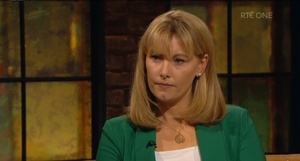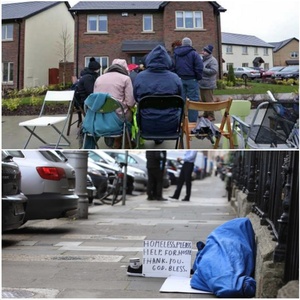
From top: journalist Cathal MacCoille, UN Special Rapporteur for Adequate Housing, Leilani Farha (centre) and Emily Logan, Chief Commissioner for the Irish Human Rights and Equality Commission, in Buswells Hotel last week at a Simon Communities event, ‘Making the Case for a Right to Housing’; Anne Marie McNally
This day last week I sat in a room in Buswells Hotel and watched one of the most impressive women I’ve come across lately give a presentation (and I come across a lot of impressive women!). That woman was UN Special Rapporteur on Housing Leilani Farha.
Her no-nonsense common-sense presentation highlighted the problems of not only Ireland but of other cities and countries that have also encountered significant difficulties with getting housing policy right.
The difference was, for most of the other cities she spoke of, she was able to give examples of how, by working with her and other agencies, those cities had been able to make progress in dealing with the housing crises they faced.
Ms Farha reminded us that Ireland has signed up to the Sustainable Development Goals (SDGs) and in doing so we have committed to ending homelessness by 2030. But what strategies are we deploying to achieve this. asked Ms Farha? Or is it yet another EU target which we sign up to but never expect to actually meet-like our climate targets?
Portugal on the other hand, have worked with Ms Farha’s team and have now implemented policies with a goal to eradicate homelessness by 2028- and they’re on track to achieve this.
Other countries and cities are also starting to get things right whereas we continue to spiral. Our homelessness figures continue to rise – despite the cynical manipulation of same by those in power. Housing continues to move further and further from the reach of many people – even those working and earning what could be considered decent wages.
Successive Government policy has tinkered around the edges, never really making the substantive changes required to shift from what has increasingly been a market-led approach to housing; an approach that is obviously failing, to a sustainable system of affordable housing that is accessible to all.
That is why the Social Democrats favour a Right to Housing. As Ms Farha pointed out; there is much confusion over what the term Right to Housing means and in her experience even Governments are confused about the concept.
Those who fear that an equal society will somehow minimise their own privilege reject the concept because ‘nobody should get a house for free’ – as Leo himself actually said in the Dáil chamber during a recent housing debate.
However if those knee-jerk reaction people took their heads from their own arses long enough they might actually see that a Right to Housing does not in fact mean that every Joe Soap can knock on Leo’s door looking for their home.
A Right to Housing enshrined either constitutionally or legislatively simple means that Government housing strategies MUST ensure that there is a wide variety of housing types that are affordable and accessible to all citizens.
In other words, Joe might want a 3 bedroom semi but he doesn’t have a right to one. What he does have a right to is a housing system where he can access the kind of unit he can afford based on his current circumstances. Basically that it is impossible for him to be completely priced out of the housing market.
In that way we move away from the spectre of homelessness hanging over people. How many people do you know who are one or two pay packets from the streets? For me it’s a lot.
And this failure of housing policy is not just costing us socially in terms of the lives we are destroying both now and into the future – over 3,000 children in emergency accommodation living in fear and uncertainty is not the recipe for a healthy next generation of society – but it is costing us economically.
The seminar Ms Farha spoke at was told that in 2017 just over €1 billion (yes, billion) was transferred to private landlords in housing supports. One third of every tenancy in the State is in receipt of a housing support payment.
It makes no sense either socially or economically and yet as a nation we continue to elect Governments that pretend the market will provide the solution to the housing emergency. It never has done in the past, it’s not doing it now and it never will do.
Housing is the number one issue of our time. Ms Farha said she would go as far as to say that it is a more pressing issue than climate because, she said, societies that cannot provide safe and secure housing options cannot be, and are not, sustainable. They will fail.
We are failing and we will continue to do so until we recognise the need to enshrine the Right to Housing either constitutionally or legislatively.
Anne Marie McNally is Social Democrats Political Director and General Election candidate for Dublin Mid-West.
Rollingnews







